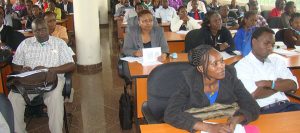Advocacy for the integration and use of mother tongues in school contexts is not new. From literary sages like Ngugi wa Thiong’o to language policymakers, the latent and salient benefits of these languages have been outlined and defended publicly. The debates are out there, even as the new CBC curriculum is inaugurated by a national examination for Grade Three students next week.
Interestingly, the issue of languages of instruction or languages in our education systems and postmodern societies has now broadened to include a focus on foreign languages in the new globalising world.
New paradigms of interaction at the level of languages cut across the so-called global North-South, East-West, and increasingly, the South-South international relations. The migration of languages traditionally domiciled in certain geographies and temporalities to newer horizons is evident in many ways. Two examples suffice here.
The increasing Sino-African ties have seen the construction of various Confucius Institutes across the nations of the continent, Kenya included. Chinese is being taught to a new generation of globalised Kenyans, with potential commercial, educational and even cultural implications.
The second example is hinged on the enduring relevance of Europhone languages even in postcolonial contexts and times. The adoption of English by erstwhile non-Anglophone countries like Rwanda and Ethiopia is one side of the coin. Our English teachers graduate and are active in the two countries.
The other side of the coin is the adoption of and advocacy for French in erstwhile non-Francophone countries, such as Kenya. This reverse story is one that, though publicly known in our country, deserves more spotlight.
For generations, the Alliance Française and other channels of foreign language teaching have entrenched the French language in our midst, especially in educational contexts. I studied the subject for two years in Bungoma High School in the mid-1990s. Kenyans have sat for French subject national exams. A vivacious community of Francophone Kenyans does exist from town to country. Learned colloquia for teachers of French have been hosted by the United States International University–Africa for many years.
For close to 10 years, Kenyatta University has been arguably the only Anglophone University in Africa with membership at the Association of Francophone Universities. Masinde Muliro University of Science and Technology (MMUST) has been in the process of joining, too. The regional AUF (Agence Universitaire de la Francophonie) Centre is hosted by the Graduate School Building in KU. The facility also hosts the Centre for French Teaching and Documentation (CFTD), born out of the collaboration between the university and the French Embassy in Kenya. The centre is headed by Dr Milcah Chokah of the Department of Literature, Linguistics and Foreign Languages.
The CFTD has been running in-service courses for secondary school teachers of French, for two sessions now, April and August 2019, each taking five days. Before the launch of the in-service sessions in April, the French government/embassy sponsored and facilitated the training of the first cohort of five trainers of trainers at the International Centre for Pedagogical Studies (CIEP) in La Réunion late 2018. They include erudite scholars of the language and its literature, such as Henry Mulama, Dismas Nkezabera, PM Nzuga and Vincente Were.
The second cohort of nine were similarly sponsored and trained in June 2019 at the same venue. The two in-service sessions so far offered have recorded 90 teachers from public and private schools offering French spread across the country. The five modules offered every session are mainly centred on methodology for effective foreign language teaching.
Speaking to the recent training for high school teachers of French, Dr Mulama says there is still, as part of the immediate future, a plan to integrate modules targeting teachers of French at the primary school level in line with the CBC.
Indeed, this is laudable because the new curriculum dispensation is one that intends to prepare our children for the new globalised and glocalised societies of the present and the future. Now our traditional languages will have to be complemented by the foreign ones. Increasingly, transnational languages, such as French, Arabic, German and Chinese, should be encouraged and adopted where possible.
This may open the eyes of current and successive generations to the brave new world of linguistic globalisation. Moreover, it will immerse them into the rich literature of these tongues not in translation, as is the prevalent case now, but aptly in the original.
By doing so, we will be moving the centre in line with the ideas of our seminal cultural icon, Ngugi wa Thiong’o, who calls for the freeing of world cultures, ours included, from the restrictions that ARE based on class, race, gender and even language.

